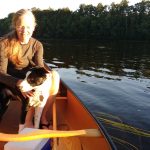BY ANNE LICHTENWALNER
Copyright is held by the author.
I WAS newly speedy, actually the fastest of the six kids, which wasn’t saying much since three were much younger than me, and neither my older sister nor my brother, the eldest, really cared much about chasing games. We’d just learned about guns, though; Jack was the first to get one, and of course we girls had to do what he did, so in a few weeks we had a total of five pistols (Mary was an infant, a bit young for it) that we’d bought down at the little mall’s toy store with our allowances. In California, in the early 1960s, you could do that.
They were, of course, small plastic pistols that shot little Styrofoam bullets. We would shriek and run, firing off shots behind us with incredible accuracy (and if not, who cared; the styro bullets bounced off glass). Just like the men from U.N.C.L.E., just like the cowboys on horseback. This was drama and magic. We could buy boxes of the silvery styro spheres for a nickel apiece; 20 boxes per gun per week per kid at our income level, tops. The game heated up until ammunition became financially limiting. Then we made the big discovery: dried navy beans made terrific substitute bullets.
Mom, in a culinary return to her Kansas roots, had rediscovered large batches of soup as a way of feeding all eight of us; a fat-bellied sack of navy beans was stashed in a kitchen cabinet. No one would notice if a handful disappeared, or if it kept happening. Pilfered beans dropped into the pistol’s chamber with a satisfying clatter. They shot straighter and with more conviction than did styro balls, but getting beaned with one was a relatively sobering experience.
The five of us older kids continued to wage running battles within the backyard’s perimeter, constantly shifting allegiances, forming ephemeral gangs. The navy bean currency had been established, a bean for a bean, and we became astute traders, lobbing volleys from the safety of the juniper bush or a window of the playhouse. It was a happy summer. I remember waking up excited every morning, cool air carrying the vaguely rank smell of the San Rafael canal at low tide.
Mt. Tamalpais rose, a snowless Fuji framed by rose-red fingertips of bottlebrush, far beyond the backyard fence. The yard had been landscaped in a Japanese manner, although we kids were allowed to run everywhere, to wear out the patch of lawn. River rocks, water-rounded, were everywhere, punctuated by shrubbery borders, by heavenly bamboo and the terrestrial variety, by dusky blue-green junipers and rows of blue-flowered agapanthus. I dreamed of that yard for years; it taught me that beauty facilitates concentration, and it taught me to love rock.
Trading bean-shots was exhilarating, brilliantly focused. Beans seemed limitless, so there was no need to recycle. One lambent evening we were at high pitch, shrieking threats at each other, then pegging our fleeing targets: BEANO! One shot got a little too close to one of the little kid’s eyes; the starch went out of it for her, and she ran to Mom for comfort. We raged on. We didn’t anticipate reprisal, there was no sense of wrongness about our battles, only the clean excitement of conflict.
Dad’s voice, then, came as a surprise, demanding surrender of the toys. “This is going too far,” he said quietly, and all of us froze at the sound of his voice. I suddenly saw us from a bird’s eye view, snapping at each other like keen little wolves. The pistols disappeared. We had been no more than targets of the most delightful kind for each other, living targets, and our exchanges were addicting because they were so quick, so vivid. Dinner that evening was a sulky, quiet one.
I think all of us felt wronged by the implication that we’d been evil when we believed we were only playing, but as well, I think we all felt guilty about the pleasure that this violence had brought. It took no more than Dad’s startling pronouncement that something so delicious was wrong, that something grownups did on TV with pride, conviction and style was inappropriate behaviour in real life, to convince me that my family was composed of sane people in an insane world. While worldly insanity could be very fun, Dad’s proclamation was a startling initiation into an ethical society that emphatically didn’t contain all grownups. I selected the privilege of joining my parents in an ethically superior enclave, enough of a snob to be sucked right in, past the open doors of projectile hedonism.
Two weeks after the armistice, pale shoots bearing fat, embryonic bean-leaves raised their bent heads between the Japanese river rocks. They were everywhere. That was the summer I began to garden.
***

Anne Lichtenwalner is a retired veterinarian living in Maine, U.S., after a career spent in the Pacific Northwest, the Caribbean and the Northeast. She is kept in line by her hard-working Border Collie, Bernie. Her writing deals with women’s identities and autonomy, but animals seem to sneak into every story.
